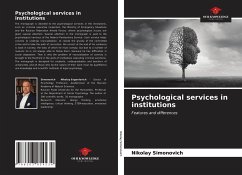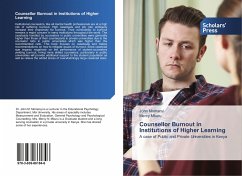
Workplace Bullying As Psychological Violence In Tertiary Institutions
Versandkostenfrei!
Versandfertig in 6-10 Tagen
62,99 €
inkl. MwSt.

PAYBACK Punkte
31 °P sammeln!
This study aimed at exploring workplace bullying as psychological violence in institutions of higher learning. University restructuring is the most important source of workplace bullying. Staff devaluing, expatriate syndrome, authoritarian management and usurpation of power, communication bullying, unknown politicized agenda, and economic/financial bullying are the main forms of workplace bullying. Negative self-image, negative emotions, low energy level, and minimal self-motivation are consequences of workplace bullying on staff psychological wellness. Interviewees cope effectively and ineffe...
This study aimed at exploring workplace bullying as psychological violence in institutions of higher learning. University restructuring is the most important source of workplace bullying. Staff devaluing, expatriate syndrome, authoritarian management and usurpation of power, communication bullying, unknown politicized agenda, and economic/financial bullying are the main forms of workplace bullying. Negative self-image, negative emotions, low energy level, and minimal self-motivation are consequences of workplace bullying on staff psychological wellness. Interviewees cope effectively and ineffectively with workplace bullying through denying-withdrawing-helplessness, group support systems, self-valorization, physical exercises, and displacement. Inclusive staff valorization, open communication, professional humane change, continuity, and the provision of professional services can help in managing workplace bullying.












